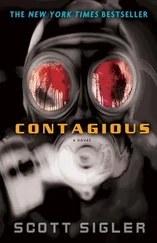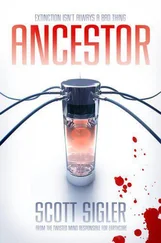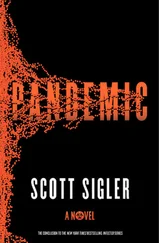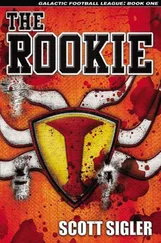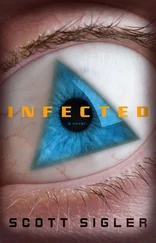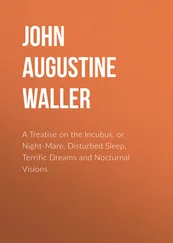“No,” Zou said. “This was a clean shoot. Inspector Clauser, you and Inspector Chang will continue to work on the Ablamowicz task force. We need you guys too much right now to put you behind a desk. That’s it, people. Get back to it.”
He felt so relieved it almost made him forget about his sour, churning stomach. Bryan didn’t care about Carlos Smith, but he did care about his job. Anything could happen in a shooting review. Ignoring his body’s numerous complaints, Bryan stood, thanked everyone for their support, then walked out of Chief Zou’s office, happy to still be a cop.
The White Room
Warm .
Toasty warm. Blankets. Soft blankets, dry blankets. Clean clothes that slid against his skin, skin that was scrubbed free of dirt and grime and sweat for the first time in months.
Aggie rolled over … and heard a metallic rattle.
He blinked a few times as he woke. Was he wearing … pajamas ? He flashed back to his childhood bed in Detroit, to his mother gently waking him with loving words and hugs, the smell of pancakes filling the small house. But this place didn’t smell like pancakes.
It smelled like paint. It smelled like bleach.
He was on his side, the blankets bunched up around him, lying on a mattress so thin he could feel the hard floor beneath. The world seemed to move, to wave , but he knew from long experience that was just the horse talking. He opened his eyes and blinked — yeah, he was still more than a little high.
Was this really happening?
Just inches from his face was a wall made of broken bricks and rounded stones, all coated with a glaze of bright white enamel so thick the surface must have been painted over and over and over again.
Something heavy hung around his neck.
Aggie’s hands shot up to find a flat, metal collar. There was barely enough room to slide a finger between the collar and his neck, but inside he felt a soft leather strip to cushion the metal against his skin.
More metallic rattling.
His hands reached behind the collar, found a chain.
He sat up, hands pulling the chain around where he could see it — stainless steel, its chromelike sheen reflecting fluorescent lights from above, each quarter-inch-thick link showing a tiny, curved reflection of his black skin and shocked face. He looked down the chain’s path. It led into a stainless-steel ring mounted flat into the white wall.
Oh, shit. Please, let this just be a bad trip .
“Ayúdenos,” a man said.
Aggie turned away from the white wall, toward the voice, and saw a family: small boy clinging to his mother, mother clinging to him, father with arms protectively wrapped around them both.
The woman and the boy looked terrified, while the man stared with eyes that promised death to anyone that came near. Black hair, tan skin — they looked like Mexicans.
All three of them wore pajamas: pale blue cotton for the man, fuchsia silk for the woman, pink flannel with blue cartoon puppies for the boy. The clothes looked clean but well used, the same way clothes looked in the Salvation Army store on Sutter Street.
Like Aggie, they all wore stainless-steel metal collars with chains leading into holes in the wall. Aggie stood and started walking around slowly, his chain rattling across the stones beneath and behind him.
“Por favor, ayúdenos,” the man said. “Ayude a mi familia.”
“I don’t speak beaner,” Aggie said. “You speak English?”
The man shook his head. “No speak.”
Figured. Fucking people coming to this country without speaking the language.
“What is this place?” Aggie said. “What the hell are we doing here?”
The man shook his head. “No entiendo, señor.”
Aggie looked around the room. The walls shimmered, shifted — the smack made it hard to focus. He wasn’t sure if he was seeing reality or not, but the circular room looked like it had a curved ceiling, sort of like a dome, about thirty feet across with a high point maybe fifteen feet off the floor. The floor looked the same as the walls: rocks and bricks laid down in a rough, flat pattern, repeatedly slathered with enamel paint. Aggie felt like he was inside a big stone igloo.
On the far side of the room stood a door of bright white bars: a prison door.
Ten mattresses lay on the floor, one for each of the circular rings Aggie counted in the walls. Chains led out of four of the rings, connecting to Aggie and the three other people. Several loose blankets lay on each mattress. The blankets, like the clothes, had that secondhand look. But everything — from the clothes to the blankets to the mattresses to the walls — looked clean .
A one-foot, circular, stainless-steel flange marked the center of the room’s floor. Aggie saw three rolls of toilet paper sitting on the flange. Was that where he was supposed to shit?
Something really fucked-up was going on here, and Aggie wanted out. He might be a bum, might have phoned in all pretense of a real life many years ago, but the significance of being a black man in a collar and chains was not lost on him.
The woman started to cry. The little boy looked at her, then started to do the same and again buried his head in her bosom.
The man kept staring at Aggie.
“I got no idea what’s goin’ on,” Aggie said. “If you want help, ask someone else.”
A metallic noise rang from the walls and echoed through the small room. Three heads looked around: Aggie, the man and the woman, eyes searching for the source of the sound. The little boy didn’t look up. Another clang — Aggie realized it came from the holes in the wall.
Then the sound of chains rattling: Aggie’s collar yanked him backward. He stumbled and fell, banging his elbow, then choked as the chain dragged him across the hard, bumpy ground. He reached out, hands grabbing for anything, but his fingers found only blankets that offered no resistance.
The woman slid across the floor, her hands clutching her child tight to her chest. “Jesús nos ayuda!”
The man tried to fight, but the chain dragged him along as easily as it did the woman.
The little boy just screamed. The chains pulled him away from his mother. Their arms grabbed at each other, but they were powerless against the steady, mechanical force.
Aggie felt his back hit the wall, then felt himself pulled up the wall, the collar’s edge digging into his lower jaw, pressing against his throat and cutting off his air. He managed to get his feet under him just as the chain pulled the collar against the wall-ring, where it clanged home with a metal-on-metal authority. The yanking stopped. Aggie sucked in a deep, panicked breath. He grabbed the collar and tried to lean forward, but the chain wouldn’t budge.
All four prisoners were in the same predicament: collars pulled tight against stainless-steel rings. Hands grabbed at necks, feet pushed against white walls, but none of them could move away.
They all stood there, waiting.
“Mama!” the boy screeched, finally finding his voice. “Qué está pasando?”
“No sé,” she said. “Sea valiente. Lo protegeré!”
For some reason, Aggie recognized that last bit of Mexican. Be brave. I will protect you .
But the mother couldn’t do anything. She was as powerless as the boy was.
The sound of a big key ratcheting open a metal lock silenced them all.
The white prison gate swung out.
Was this really happening? Everything seemed to blur; the walls blazed with a white that couldn’t possibly exist in the real world. A bad trip, a bad trip, that’s all this is, I’m tripping .
When he saw what walked through the cell door, Aggie’s instincts took over. It didn’t matter if he was high, dreaming or stone-cold sober — he pulled harder than he’d ever thought possible, pulled so hard he almost choked himself out … but still the collar refused to budge.
Читать дальше



